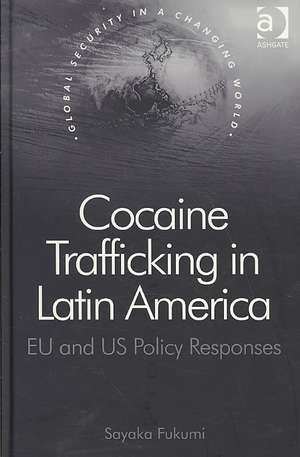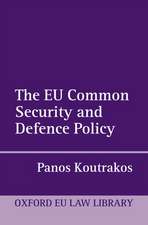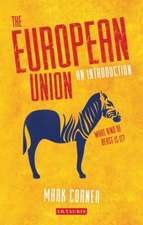Cocaine Trafficking in Latin America: EU and US Policy Responses: Global Security in a Changing World
Autor Sayaka Fukumien Limba Engleză Hardback – 28 feb 2008
Preț: 1005.04 lei
Preț vechi: 1225.65 lei
-18% Nou
Puncte Express: 1508
Preț estimativ în valută:
192.31€ • 200.79$ • 159.16£
192.31€ • 200.79$ • 159.16£
Carte tipărită la comandă
Livrare economică 04-18 aprilie
Preluare comenzi: 021 569.72.76
Specificații
ISBN-13: 9780754670438
ISBN-10: 0754670430
Pagini: 292
Dimensiuni: 156 x 234 x 18 mm
Greutate: 0.59 kg
Ediția:1
Editura: Taylor & Francis
Colecția Routledge
Seria Global Security in a Changing World
Locul publicării:Oxford, United Kingdom
ISBN-10: 0754670430
Pagini: 292
Dimensiuni: 156 x 234 x 18 mm
Greutate: 0.59 kg
Ediția:1
Editura: Taylor & Francis
Colecția Routledge
Seria Global Security in a Changing World
Locul publicării:Oxford, United Kingdom
Recenzii
'...extremely readable and cogently argued account of the securitization of cocaine trafficking, highlighting different policy responses by the EU and the US. This scholarly work draws from a wealth of interviews, and should be of interest not only to academics, policy makers and practitioners in this area, but also to a wider international relations audience.' Mike King, Birmingham City University, UK 'In order to demonstrate that the politics of the European Union and the United States towards the flow of cocaine coming from Latin America differ considerably, Fukumi first explains the security problems posed by drug trafficking then, thanks to an in-depth study of Plan Colombia, discusses the divergences between the two partner powers of the Colombian government. As well-ordered as music manuscript paper, from a research point of view this work is impeccable.' Etudes Internationales 'Comparative work in criminology is quite rare; comparative work in criminal justice policy is even more rare. Sayaka Fukumi provides a comprehensive review of policy responses to cocaine trafficking by the European Union and the United States. The book provides an encyclopedic review of the policy responses... this work is a very valuable reference document for those interested in studying drug control policy with regard to cocaine... The book is destined to become an important reference text in understanding and documenting the response of the European Union and the United States to cocaine trafficking from the Andes region.' Crime Law and Social Change
Cuprins
Acknowledgments; Introduction; Chapter 1 Securitisation and Drug Control Policy: Theoretical Frameworks; Chapter 2 The ‘Securitisation’ of Cocaine Trafficking in the European Union; Chapter 3 The ‘Securitisation’ of Cocaine Trafficking in the United States; Chapter 4 EU Drug Control Policy Towards the Andes; Chapter 5 US Drug Control Policy Towards the Andes; Chapter 6 Plan Colombia: An Attempt at Multinational Co-operation; Chapter 7 Conclusion;
Descriere
The European Union and the United States have identified Latin American cocaine trafficking as a security threat, but their policy responses to it have differed. This book examines the ways in which the EU and the US have conceptualized this threat.


























